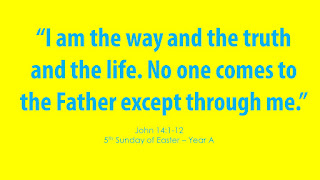Jesus said to his disciples: "Do not let your hearts be troubled. You have faith in God; have faith also in me.
In my Father's house there are many dwelling places. If there were not, would I have told you that I am going to prepare a place for you?
And if I go and prepare a place for you, I will come back again and take you to myself, so that where I am you also may be.
Where (I) am going you know the way."
Thomas said to him, "Master, we do not know where you are going; how can we know the way?"
Jesus said to him, "I am the way and the truth and the life. No one comes to the Father except through me."
If you know me, then you will also know my Father. From now on you do know him and have seen him."
Philip said to him, "Master, show us the Father, and that will be enough for us."
Jesus said to him, "Have I been with you for so long a time and you still do not know me, Philip? Whoever has seen me has seen the Father. How can you say, 'Show us the Father'?
Do you not believe that I am in the Father and the Father is in me? The words that I speak to you I do not speak on my own. The Father who dwells in me is doing his works.
Believe me that I am in the Father and the Father is in me, or else, believe because of the works themselves.
Amen, amen, I say to you, whoever believes in me will do the works that I do, and will do greater ones than these, because I am going to the Father.
---
Reflection
Pope Francis writes in Misericordiae Vultus that Jesus is the face of the Father's Mercy. Like Philip, we are ignorant of the Father without Jesus. The Father, the first Person of the Trinity, is the Great Lover. Human as we are, we cannot feel that love if not shared by the Beloved, the Only Son, Jesus Christ. Jesus makes concrete for us the love of the Father. This is why Jesus is called the Mediator of the Father's love, He is love Incarnate, that is, love-made-flesh.
The love between the Father and the Son is bountiful and unmeasurable. Jesus was not exaggerating when he said that, "In my Father's house there are many dwelling places." The eternal plan of the Trinity was to include us into that loving embrace of the Father and the Son, in the Holy Spirit. We are to dwell in them as they are to dwell in our humanity.
This, I believe, is the continuing mission of all Christians: to perpetuate the incarnation of God's love. That we become for others the concrete manifestation of the Father's love in the same way that Jesus was the love-made-flesh for us. And this is the Spirit of the Easter season - to introduce us to a future where everyone can claim that God's love for them is real.
God's love becomes real in the love of mothers for their children - in the way they touch, the way the soothe, the way they cradle us in their arms. It becomes real in the sweat of fathers who sacrifice themselves for their families. It becomes real to people whose friends remained in the journey through thick and thin. It becomes real to the world that witnesses Christians living out their Baptism through service and joy.
No one can come to the Father except through Jesus. This highlights the role of the Sacrifice of the Eucharist for us. Since in the bread and wine we have the Body and Blood of Jesus Christ, made food for our bodies and our souls. Blest and broken for us, it is the tangible and sensible sacrament of the Father's love. It is Jesus Christ himself who makes present in the Mass the unchanging promise of Easter. It is right then that we join Him in his Thanksgiving.
Are we then as Christians the face of Jesus to others?
